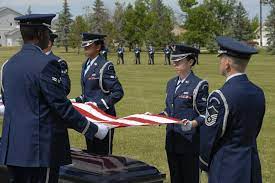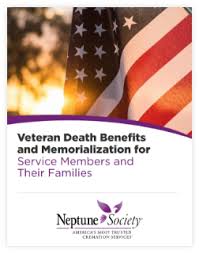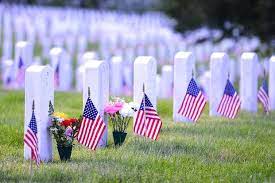The death of a loved one is always a difficult and emotional time. For the families of veterans, there are additional challenges and concerns to consider. One of these concerns is the availability of veterans affairs death benefits.
Veterans affairs death benefits are available to the families of eligible veterans who have passed away. These benefits can provide financial assistance to help cover the costs associated with a veteran’s final arrangements and can also include ongoing support for surviving family members.
One of the most important things to know about veterans affairs death benefits is that they are not automatic. In order to receive these benefits, families must apply for them through the Department of Veterans Affairs (VA). This application process can be complex, so it is important to seek guidance from a qualified professional or organization that specializes in assisting with VA claims.
The amount of money available through veterans affairs death benefits varies depending on several factors, including the veteran’s service history and cause of death. For example, if a veteran died as a result of a service-related disability, their family may be eligible for additional compensation beyond what is available for non-service related deaths.
In addition to financial assistance, veterans affairs death benefits can also provide other forms of support for surviving family members. This may include counseling services or assistance with applying for other VA benefits such as education or healthcare.
It is important for families to be aware that there are strict time limits for applying for veterans affairs death benefits. In general, applications must be submitted within one year after the veteran’s death. However, there are some exceptions to this rule, so it is always best to consult with a professional who can help navigate the process.
In conclusion, veterans affairs death benefits can provide much-needed support and assistance during an already difficult time. Families should be aware that these benefits are not automatic and that there is an application process involved. Seeking guidance from qualified professionals can help ensure that families receive all the support they are entitled to under VA regulations.
8 Tips for Navigating Veterans Affairs Death Benefits
- Research state and federal benefits available to veterans’ families, such as burial allowances, death gratuities, and financial assistance.
- Make sure you have all the necessary documents for filing a claim, including the veteran’s death certificate and discharge papers.
- Apply for Veterans Affairs (VA) death benefits as soon as possible after the veteran’s death; some benefits are time-sensitive and may be reduced or lost if not applied for in a timely manner.
- Contact your local VA office to get help with filing claims or to ask questions about specific benefits or eligibility requirements.
- Check with your state department of veterans affairs to see if there are any additional state-level benefits available to veterans’ families in addition to federal VA benefits.
- If you need assistance with funeral costs, you can apply for a VA burial allowance or other financial assistance programs offered by the VA or other organizations such as The American Legion or Veterans of Foreign Wars (VFW).
- Consider setting up a trust fund in the veteran’s name if there are funds left over after paying for funeral expenses; these funds can be used to provide ongoing support for family members who were dependent on the veteran’s income before his/her death.
- Reach out to community resources like Veteran Service Organizations (VSOs) that offer free advice and support services related to veterans affairs death benefit claims
Research state and federal benefits available to veterans’ families, such as burial allowances, death gratuities, and financial assistance.
When a veteran passes away, their family may be eligible for various state and federal benefits. These benefits can provide financial assistance to help cover the costs associated with a veteran’s final arrangements and can also include ongoing support for surviving family members.
To ensure that families receive all the support they are entitled to, it is important to research state and federal benefits available to veterans’ families. This may include burial allowances, death gratuities, and financial assistance.
Burial allowances are available through both state and federal programs. These allowances can help cover the cost of funeral expenses, burial plots, and other related expenses. Death gratuities are one-time payments made by the government to eligible survivors of service members who die while on active duty or in certain circumstances after leaving active duty.
Financial assistance may also be available through various state programs. For example, some states offer financial assistance for education or job training to surviving spouses or children of veterans.
To learn more about these benefits, families should consult with a qualified professional or organization that specializes in assisting with VA claims. They can help navigate the complex application process and ensure that families receive all the support they are entitled to under VA regulations.
In conclusion, researching state and federal benefits available to veterans’ families is an important step in ensuring that they receive all the support they need during a difficult time. By taking advantage of these programs, families can ease the financial burden associated with a veteran’s final arrangements and receive ongoing support as needed.
Make sure you have all the necessary documents for filing a claim, including the veteran’s death certificate and discharge papers.
When it comes to filing for veterans affairs death benefits, having all the necessary documents is crucial. These benefits can provide much-needed financial assistance and support for surviving family members, but the application process can be complex and time-consuming. That’s why it’s important to gather all the required documents ahead of time.
One of the most important documents you will need is the veteran’s death certificate. This document will provide proof of the veteran’s passing and will be necessary for filing a claim for benefits. You should also make sure to have a copy of the veteran’s discharge papers or separation documents, which will provide information about their service history.
Other documents that may be required include marriage certificates, birth certificates for children, and any medical records related to the veteran’s death. It’s important to keep all these documents organized and easily accessible so that you can quickly provide them if needed.
By having all the necessary documents on hand, you can help ensure that your claim for veterans affairs death benefits is processed as quickly and smoothly as possible. This can provide peace of mind during an already difficult time and help ensure that you receive all the support you are entitled to under VA regulations.
Apply for Veterans Affairs (VA) death benefits as soon as possible after the veteran’s death; some benefits are time-sensitive and may be reduced or lost if not applied for in a timely manner.
If you are the surviving family member of a veteran who has recently passed away, it is important to apply for Veterans Affairs (VA) death benefits as soon as possible. Some benefits are time-sensitive and may be reduced or lost if not applied for in a timely manner.
The VA offers a range of death benefits to eligible family members, including financial assistance to help cover the costs associated with a veteran’s final arrangements and ongoing support for surviving family members. However, these benefits are not automatic and must be applied for through the VA.
One of the most important reasons to apply for VA death benefits as soon as possible is that some benefits have strict time limits. For example, if a veteran dies as a result of a service-related disability, their spouse or dependent children may be eligible for Dependency and Indemnity Compensation (DIC). However, this benefit must be applied for within one year of the veteran’s death. If the application is not submitted within this timeframe, the benefit may be reduced or lost altogether.
Other VA death benefits also have specific application deadlines or time limits that must be adhered to in order to receive full compensation. By applying for these benefits promptly after a veteran’s death, families can ensure they receive all the support they are entitled to under VA regulations.
In conclusion, applying for Veterans Affairs (VA) death benefits as soon as possible after a veteran’s death is crucial in order to avoid missing out on time-sensitive benefits. Families should seek guidance from qualified professionals who can help navigate the complex application process and ensure they receive all available support from the VA.
Contact your local VA office to get help with filing claims or to ask questions about specific benefits or eligibility requirements.
Navigating the process of applying for veterans affairs death benefits can be complex and overwhelming. However, there is help available for those who need it. One valuable resource is your local VA office.
By contacting your local VA office, you can get assistance with filing claims and answering questions about specific benefits or eligibility requirements. The staff at these offices are trained to provide guidance and support to veterans and their families.
In addition to helping with the application process, VA offices can also provide information about other resources that may be available to you and your family. This may include counseling services, educational opportunities, or healthcare benefits.
It is important to note that each VA office may have different hours of operation or appointment procedures, so it is best to check ahead of time before visiting in person. Many offices also offer virtual or phone appointments for added convenience.
Overall, contacting your local VA office can be a valuable step in getting the support and assistance you need during a difficult time. Don’t hesitate to reach out for help if you need it.
Check with your state department of veterans affairs to see if there are any additional state-level benefits available to veterans’ families in addition to federal VA benefits.
When it comes to veterans affairs death benefits, it is important for families to know that there may be additional state-level benefits available in addition to the federal VA benefits. These state-level benefits can vary widely depending on the state, so it is important for families to check with their state department of veterans affairs to see what may be available.
Some examples of state-level benefits that may be available include financial assistance for funeral and burial expenses, property tax exemptions, and educational benefits for surviving family members. In some cases, these benefits may be more generous than what is available through the federal VA.
It is important for families to understand that these state-level benefits are separate from federal VA benefits and require a separate application process. Families should also be aware that eligibility requirements may vary depending on the benefit in question.
By checking with their state department of veterans affairs, families can ensure that they are aware of all the potential resources available to them. This can help provide much-needed financial and other forms of support during an already difficult time.
In conclusion, families should not assume that federal VA benefits are the only resources available to them after the death of a veteran. Checking with their state department of veterans affairs can help ensure that they are aware of all potential resources and can take advantage of any additional support that may be available.
If you need assistance with funeral costs, you can apply for a VA burial allowance or other financial assistance programs offered by the VA or other organizations such as The American Legion or Veterans of Foreign Wars (VFW).
Losing a loved one is never easy, and the financial burden of funeral costs can make the grieving process even more difficult. For families of veterans, however, there are options available to help alleviate some of this stress. One such option is the VA burial allowance or other financial assistance programs offered by organizations such as The American Legion or Veterans of Foreign Wars (VFW).
The VA burial allowance is a tax-free benefit available to eligible veterans’ families to help cover funeral and burial expenses. The amount of this allowance varies depending on several factors, including the veteran’s service history and cause of death. In addition to the VA burial allowance, other organizations such as The American Legion or VFW also offer financial assistance programs for veterans’ families.
To apply for these benefits, families must submit an application through the Department of Veterans Affairs or the specific organization offering the program. It is important to note that there are strict time limits for applying for these benefits, so it is best to seek guidance from a qualified professional as soon as possible.
While no amount of money can ease the pain of losing a loved one, these programs can provide much-needed financial support during a difficult time. Families should not hesitate to explore all options available to them in order to ensure that their loved one receives a proper farewell and that they are not left with undue financial stress.
Consider setting up a trust fund in the veteran’s name if there are funds left over after paying for funeral expenses; these funds can be used to provide ongoing support for family members who were dependent on the veteran’s income before his/her death.
When a veteran passes away, their family may be eligible for veterans affairs death benefits to help cover the costs associated with their final arrangements. However, if there are funds left over after these expenses have been paid, families may want to consider setting up a trust fund in the veteran’s name.
A trust fund can provide ongoing financial support for family members who were dependent on the veteran’s income before their death. This can be especially important for spouses or children who may have relied on the veteran’s income to cover daily living expenses.
Setting up a trust fund is a relatively simple process that can be done with the help of an attorney or financial advisor. The funds in the trust can be invested and managed to provide ongoing income for the beneficiaries.
It is important to note that setting up a trust fund should not impact eligibility for veterans affairs death benefits. These benefits are based on specific criteria and are not affected by additional sources of income or support.
In conclusion, setting up a trust fund in the name of a deceased veteran can provide ongoing financial support for their family members. This can be especially helpful for those who were dependent on the veteran’s income before their passing. Families should consult with professionals to ensure that they understand all of their options and how they may impact eligibility for other benefits.
Reach out to community resources like Veteran Service Organizations (VSOs) that offer free advice and support services related to veterans affairs death benefit claims
For families of veterans who have passed away, navigating the process of applying for veterans affairs death benefits can be overwhelming. Fortunately, there are community resources available that can provide free advice and support services to help with this process.
One such resource is Veteran Service Organizations (VSOs). These organizations are made up of veterans and their families who have experience navigating the VA system and can provide valuable insight into the claims process. They can also offer emotional support and guidance throughout what can be a difficult time.
VSOs offer a range of services related to veterans affairs death benefit claims, including assistance with completing application forms, gathering necessary documentation, and tracking the status of claims. They can also help families understand the various benefits available and determine which ones they may be eligible for.
Perhaps most importantly, VSOs offer a sense of community and connection for families who may feel isolated during this time. By connecting with other families who have gone through similar experiences, they can find comfort and support in knowing that they are not alone.
If you are a family member of a veteran who has passed away, reaching out to VSOs in your area is an excellent way to get started on the process of applying for veterans affairs death benefits. These organizations can provide invaluable advice and support throughout what can be a complex and emotional process.



